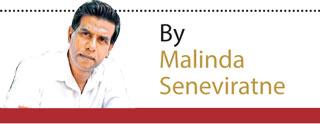Reply To:
Name - Reply Comment
 There’s talk of Provincial Council elections. Various parties or rather their leaderships have instructed the respective ranks and files to get ready. A good time, then, to talk of this particular political exercise.
There’s talk of Provincial Council elections. Various parties or rather their leaderships have instructed the respective ranks and files to get ready. A good time, then, to talk of this particular political exercise.
Now Provincial Council elections are, first and foremost, part of constitutional requirements. It’s necessitated by the 13th Amendment to the Constitution, illegally though its passage in Parliament was. It was a product of the infamous Indo-Lanka Accord which, as is well known, was essentially for India, by India and with India kind of operation.
 Of course the Provincial Councils have since then acquired the legitimacy that elections yield, even though the fact of contesting had little or nothing to do with the objectives of that piece of ‘legislation.’ Simply, elections constitute the bread and butter of politicians. Parties in power use such (relatively) minor elections to test approval or otherwise while for those in the opposition they are useful for regrouping after defeats at major elections. For individual politicians it’s about political careers. For the people, well, at least a moment of entertainment and a brief (and minor) validation of citizenship.
Of course the Provincial Councils have since then acquired the legitimacy that elections yield, even though the fact of contesting had little or nothing to do with the objectives of that piece of ‘legislation.’ Simply, elections constitute the bread and butter of politicians. Parties in power use such (relatively) minor elections to test approval or otherwise while for those in the opposition they are useful for regrouping after defeats at major elections. For individual politicians it’s about political careers. For the people, well, at least a moment of entertainment and a brief (and minor) validation of citizenship.
They were originally conceptualised as a solution to what is carelessly called ‘ethnic conflict.’ ‘Careless’ because the lines and the regions are not drawn from the ‘problems’ that the 13th sought to alleviate. They do not, for example, describe ‘traditional homelands (exclusive or otherwise) by any stretch of the imagination. The aggrieved polities are not contained by the lines. The relevant densities rebel against the ‘logic’ of devolution alone the lines.
Be that as it may, provincial elections are now a constitutional requirement, even though few are interested in them. The devolution brigades forgot about the 13th, the problems it was supposed to resolve etc., when the previous regime refused to hold provincial council elections. Those who whine about democracy at every turn somehow forgot that elections are important elements of a democracy. Now, typically their democracy angst only surfaces when the UNP (or its various avatars, for example the SJB) is out of power. And yet, this time around, when Sri Lanka and in particular the current government was put under a trial in a kangaroo court in Geneva, the prosecutors (who are also wont to switch roles with the judges and the jury) were conspicuously (and hilariously) silent on provincial council elections not being held.
The Government would do well to consider alternative courses of action. For example, why not a referendum on the 13th? That would settle the question once and for all
So, we’ve gone several years now without PC elections, but that hasn’t really bothered anyone. The provincial administration has carried on regardless. No complaints from the politicians and more importantly, none from the people in these provinces.
So we have to consider the question, ‘do we need these?’ What’s happened over the past three decades clearly says ‘no.’
And yet, they are, as mentioned above, a constitutional requirement and as such need to be held. On the other hand, the constitution is currently under review. At least in the sense any committee appointed to draft a new constitution is expected to review the existing one.
Elections constitute the bread and butter of politicians. Parties in power use such (relatively) minor elections to test approval or otherwise while for those in the opposition they are useful for regrouping after defeats at major elections
Now, for argument’s sake, let’s say that PC elections are held and a few weeks later the committee of experts tasked to draft a new constitution comes up with a document that essentially repeals the 13th amendment. What then?
Now even if no one is really interested in Provincial Councils (as per the evidence of the past 3-4 years), the very fact of holding such elections and returning members to the various Provincial Councils would be cited as ‘people’s will’ AGAINST such recommendations by the committee of experts, never mind if people voted in order to express endorsement or objection of the current government, needed some political entertainment or wanted to feel recognised and valued for a change. The fact of holding elections would be considered as an overall aye in a ‘referendum’ on the 13th Amendment itself.
And yet, as mentioned above, elections need to be held. Postponement for reasons such as the above, valid though they may be, is not a good thing. The argument, ‘they postponed and hardly an eyebrow was raised, and therefore we shall postpone too,’ is weak. The errors of a previous government does provide a precedent, but refusal to correct course does not yield democratic brownie points.
This is why the government would do well to consider alternative courses of action. For example, why not a referendum on the 13th? That would settle the question once and for all. It’s a direct question and therefore ‘mandate’ cannot be twisted and turned as per the whims and fancies of the interpreter
of outcome.
Better still, the committee of experts can release at least an interim report of progress on work done regarding the formulation of a new constitution. They’ve been at it for many months now. It’s not as though they are starting from scratch. The Second Republican Constitution (of 1978) has been reviewed enough over the past 43 years. The debates have not been behind closed doors. It’s all out there in the public domain. It’s unlikely that the experts have been ignorant of the relevant debates. They are, after all, citizens. They are, more likely than otherwise, people who have exercised their franchise. They are experts and as such can be expected to have reflected on the pros and cons of the 1978 constitution and have had more than a cursory glance at the 13th Amendment so to speak. It cannot be that their expertise is limited to, say, the understanding that no less than 20 amendments in less than 40 years indicates more than a half-baked argument for reform.
In any event, it is not entirely unfair for the public to expect these experts to say something, anything, about their work so far. It is good that they are not in a hurry, for hasty reform can have and has had serious consequences. The 19th amendment, from draft to SC opinion to the disregard of such opinion to passage and eventual submission to the SC for determination is a classic case of how not to do constitution reform, for example. On the other hand, ruminating endlessly does not help either. The talk about holding provincial council elections, if not anything, ought to alert the experts to get the reform process off the blocks. They cannot be ignorant of the fact that the very holding of PC elections can stump their work, as argued above.
So, here’s a question for Mr. Romesh De Silva and the team of experts: how about a status report?
[email protected].
www.malindawords.blogspot.com.